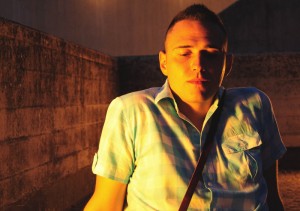American flags adorn the t-shirts, walls and dreams of young people.
URBINO, Italy – Marco Pierleoni is an expert on all the things he hates.
As a guide at the National Gallery of Marche here, the 23-year-old spends his days explaining the history and significance of the city’s treasured Renaissance masterpieces that surround visitors to the famous Ducal Palace.
And he can’t stand it.
“We are in a golden cage,” says Marco, a psychology major at the University of Urbino. “It’s beautiful, but we’re so closed (as a culture), and we can’t do what we want. Tradition here is so strong, and people can’t understand why I don’t like it.”
While young Americans might be drawn to Italy by the beauty and romance of its ancient culture, their counterparts here want something else entirely. Marco and many of his fellow students would happily trade Renaissance villages, vineyards and olive groves for the land of Johnny Cash, Elvis Presley and cowboys — anything but a life trapped inside of Urbino’s walls.

Interviews with university students in June — the height of graduation season — revealed a generation of young people with heaps of scorn for their homeland, and endless love for almost everything U.S. They wear t-shirts printed with American expressions or the U.S. flag, listen to American music, and plaster their apartment walls with Old Glory.
Their passions for America seemed to be linked to a growing frustration with Italy’s job market, and a lifestyle burdened by centuries-long traditions. To them, success lies abroad.
Alessandra Calanchi, 53, an American literature and culture professor at the University of Urbino, says many Italian students long for the America often portrayed in popular media.
“They tend to overlap reality and fiction,” Calanchi says. “They imagine a reality that is not exactly American reality.”
But for those students who do make the pilgrimage to America, that reality is often good enough.
When Elena Sorchiotti, who goes by Helen Brown, 22, traveled to New York City for the first time in 2011, she found bliss.
[pullquote]When I went out from Grand Central Station, I started looking up at the sky, but I didn’t see the sky. Then I started walking without breathing. I had to stop and sit down, and then I started crying. It was so beautiful.[/pullquote]
“When I went out from Grand Central Station, I started looking up at the sky, but I didn’t see the sky,” says Brown, a language major. “Then I started walking without breathing. I had to stop and sit down, and then I started crying. It was so beautiful.”
Once the tears subsided, Brown called her mom in a nearby café. “I told her, ‘I think I’ve found my place. This is like if I was dead and went to paradise.’ ”
Brown will spend two months this November in Washington, D.C. to write her final college paper on American politics and history. She can’t wait.
According to Calanchi, the young Italians’ desire to leave the country stems from the lack of jobs and a growing frustration of Italian politics, headed by Prime Minister Mario Monti.
“No politicians are really thinking about their future,” Calanchi says.
In April 2012, the unemployment rate of Italy reached 10.2 percent, 2 percent greater than the U.S.’s 8.1 percent. With the cost of living comparable to indexes in New York City, job security is the major concern of recent graduates.
“They cut the budget for everything but politics,” says Simone Balestrino, a language major fed up with the state’s education budget cuts.

Balestrino is desperate not only to leave Urbino, but Italy. After living in the U.S. for four years, Simone craves American culture, traffic laws – and steak.
For this reason, he said, readjusting to life in Italy was “traumatic.”
That challenge is also felt by adults who have experienced life in the U.S. American Carolyn Burke, 41, first came to Urbino from Philadelphia in 1989 when she was 19 years old for a summer language program. She returned eight years later, met her husband, an English professor at the university, and began a life in Urbino. After six years here, she’s “involved in the fabric of the community.”
But embedding herself wasn’t an easy transition. Constant criticisms about how she was raising her two children threw Burke into a deep depression.
“I felt really trapped,” Burke says. “I was treated like I was the outsider, the idiot, the weirdo. It got to the point where I didn’t want to leave the house.”
She now sees Urbino’s brick walls as a safe place for her children, 7 and 4 years old, who spend summer evenings playing at Fortezza Albornoz, a field and playground overlooking the Ducal Palace.
But the city’s safe-haven atmosphere that Burke and other mothers treasure is what college students despise the most.
For Brown, who dreams of studying at Georgetown University in Washington, D.C., returning to Urbino from the U.S. was jarring. The tears she once cried over New York’s majesty turned into tears of hopelessness.
“I didn’t see my future in Italy anymore,” says Brown, whose apartment is draped with American flags, “I love America” refrigerator magnets and pictures of the Statue of Liberty. “It’s like going from paradise to hell, or something like it.”
Enrica Rossi, 42, a lifelong Urbino resident and mother of two, recalls the burden of growing up in a small Italian town.
At 16, Rossi flew to London, where she experienced privacy and not knowing her neighbors – something she came to like after the very public life residents live in the crowded spaces inside the walls of old Urbino.
[pullquote]When I was 20, I thought that if I moved away, my parents would have died.[/pullquote]
“Young people here live as if it were big brother always watching you,” Rossi says. “What I used to miss the most when I came back to Urbino was the invisibility I had [in London].”
Rossi admits her decision to stay in Urbino is one she wouldn’t make today.
“When I was 20, I thought that if I moved away, my parents would have died,” she says. “That’s how I conditioned my life.”
But despite a burning desire to leave what they see as the restrictions of traditional Italian life behind, there are some aspects of Italian culture every young Italian cherishes — their grandmother’s pasta recipes, Renaissance art, fashion and the importance of eating meals together.
For students and adults alike, though, the Italy they love seems to be found mostly in the kitchen or hanging on the walls of famous museums.
“I don’t think that Italians love Italy,” Brown says. “Some do, but I think that the great part of Italians love themselves more than Italy.”
Multimedia